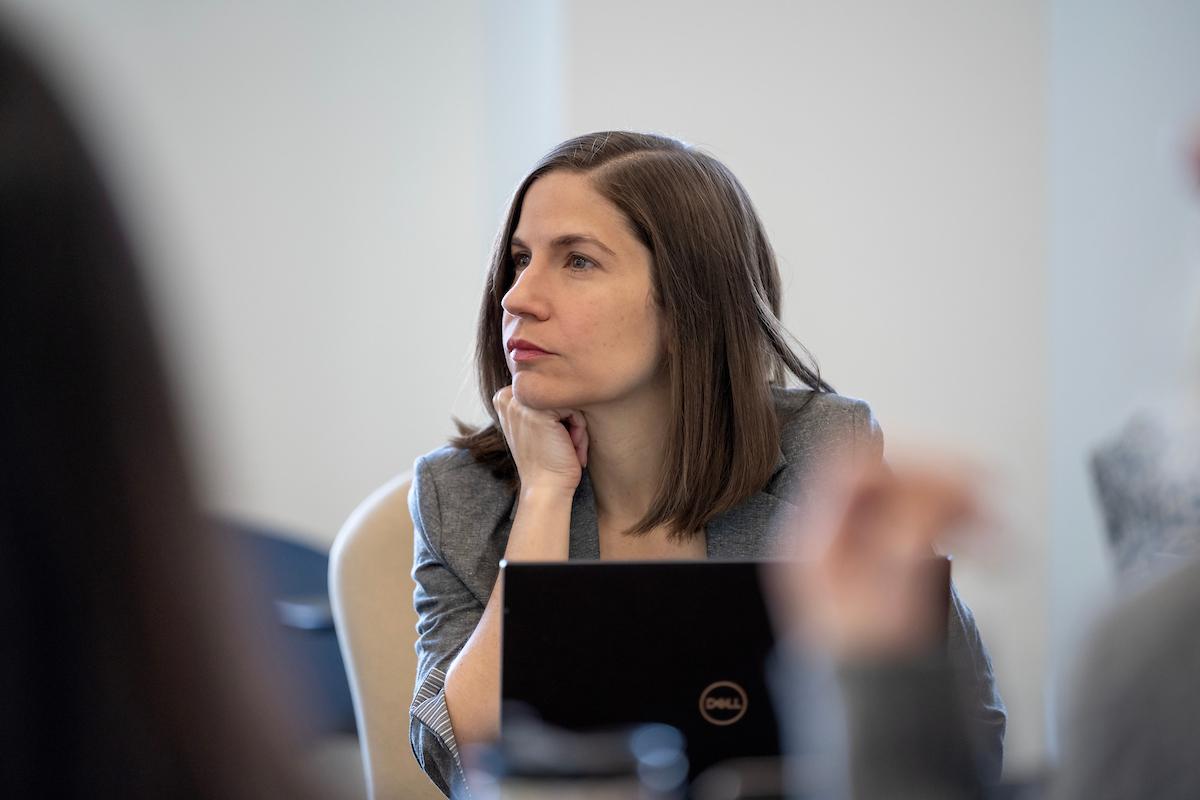F&M Stories
Expectant Mothers Say Fetus Resembles Partner
Almost three-fourths of women are certain the fetus in their ultrasound image resembles their partner, but men are far less convinced, if at all, says Franklin & Marshall College Psychology Professor Carlota Batres.
Her research shows this male uncertainty has an interesting reason as does female certainty.
“I had friends who would share ultrasound images and they would say, ‘You know, he has so-and-so's nose’ or ‘I think it looks like so-and-so,’” Batres says. “In my mind, this looks like a 20-week-old fetus, but it would make sense for mothers to have an evolutionary bias for claiming paternal resemblance.”

This inspired her yearslong study with then-student and fellow researcher Amy Mullen ’21, who is now a senior operations associate at a Manhattan charter school.
“I had taken numerous classes with Professor Batres, and loved every one,” says Mullen, who was preceptor for her as well as teaching assistant for her upper-level psychology courses.
With this level of experience, the professor asked Mullen to help with her research.
“I was beyond excited to do so!” Mullen says. “My role was to essentially look through existing research in the field and ensure that the study we were looking to conduct hadn’t previously been done before.”
When Batres became pregnant, she spoke with Lauren Trainor, a certified nurse-midwife at a local obstetrics and gynecology practice. Trainor introduced her to the ultrasound manager, Sonya Krofl.
“Sonya was really excited for the study and instrumental to the data collection,” Batres says.
Trainor, Krofl, and Mullen became co-authors of Batres’ paper, “Investigating perceptions of fetal resemblance,” published in March 2025.
Fetal Resemblance Research
“It would be beneficial for mothers to believe that the fetus looks like the father in order to claim paternal resemblance and get investment from the alleged father of that child,” Batres says.Why do expectant mothers think the fetus resembles their partner?
“It would be beneficial for mothers to believe that the fetus looks like the father in order to claim paternal resemblance and get investment from the alleged father of that child,” Batres says.
While she made no claims about who the image in her own ultrasound looked like, Batres says when her daughter was born relatives and friends told her the infant looked like her husband.
“Research shows that relatives, especially maternal relatives, are more likely to say the child resembles the father because, again, they're trying to claim paternal resemblance so that the father invests in the mother and the child,” Batres says.
Previous studies have found that children born to fathers different from their alleged fathers range from 1% to as high as 30% with the average around 3%.
“Fathers can be certain now that we have DNA, but in our evolutionary past, there wasn't any way for the fathers to be certain that that was their child,” Batres says. “And one of the ways that they gained that certainty is by having people say that the child resembles them.”
For infants to actually resemble the biological father could have been dangerous.
“It wouldn't have benefited a child to resemble their actual biological father, if the child was not fathered by their alleged father,” Batres says. “That would have increased the risk of infanticide.”
Batres believes seeing resemblances in infants is done unconsciously. Photos of a child shown to strangers are more often matched to the mother.
“Infants resemble their mothers more, not their fathers, ” she says.
Read more on Batres’ research.
Related Articles
February 24, 2026
F&M Alumnae Power Students’ Future Success in Finance
A recent gift from two F&M leaders provides annual funding for hands-on career experiences.
February 24, 2026
Brett Harwood ’71 Makes $1 Million Gift to Support Jewish Life, Student Experience
A transformational gift of $1 million from Brett Harwood ’71 will support F&M’s vibrant Jewish life programming, foster campus dialogue, fund a faculty position and boost the College’s student retention efforts.
February 20, 2026
Work on the Wild Side with Lillian Basom '08, F&M Vivarium Director
Lillian Basom ’08 loved Franklin & Marshall’s vivarium so much that she never left. In fact, she has been the director of operations since 2011. The research facility houses a variety of rodents, reptiles, birds, fish, invertebrates and capuchin monkeys.
